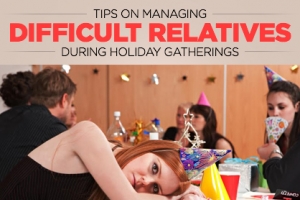Tricks for Getting Along with Anyone
Respect goes a long way
There are a few simple rules that therapists recommend to help others learn to get along with practically anyone. One of the most important components is respect. Treat others with respect, and you are much more likely to be treated the same.
Having a good sense of humor, and an innate calmness also helps.
Find out what our experts recommend to help you learn to get along with that difficult co-worker, grumpy friend or harried stranger at the grocery store.

Learn to appreciate yourself
Start by having a good relationship with yourself, said Ben Adams, clinical psychologist and researcher, and author
of new book The Creative Process Diet.
“When we don't get along with others, often this is a manifestation of some way in which we are not relating well to ourselves or not treating ourselves with self-love and self-respect. When we begin to treat ourselves with love and respect, it naturally becomes easier for us to get along well with others. In other words, getting along well with others is an inevitable ripple effect of getting along well with oneself,” Adams said.
Carl Grody, a family therapist in Ohio, said he considers treating people with respect the single most important way to get respect from others.
“Just be yourself. Trying to get along with everyone often means trying to please everyone, which simply isn't possible. If you treat people with respect and stay true to who you are, you'll not only get along with most people, but you'll also be able to set fair boundaries when people try to take advantage of you,” Grody said.
He also suggested using the attention principle. “Give attention to behaviors that you like in other people, and those behaviors should increase. Ignore behaviors that you don't like, and they'll eventually happen less often or vanish altogether. Attention is like air to a fire. Fan the fire, and it grows. Smother the fire, and it goes out. This approach works in any type of relationship.”
When we don't get along with others, often this is a manifestation of some way in which we are not relating well to ourselves or not treating ourselves with self-love and self-respect.
Think before speaking
“Take the time to think before speaking,” said Tina Tessina, psychotherapist and author. “What will the consequences be of what you're about to say? Will anyone be hurt or upset? Is there a way you can say it that will still be truthful, but not hurtful? Instead of telling your sister she looks fat in the dress, think of a dress she has that looks better, and say, ‘You know, Susie, you look so great in the blue dress, why not wear that one?’”
“The benefit of thinking before speaking is you'll keep your job or get that promotion; you won't be rear-ended by some jerk who has more road rage than you; and you'll get your groceries without being thrown out of the store. There's a reason we don't get too confrontational with the boss: if we did, things would not go well at work. I firmly believe that what goes around comes around. When we are thoughtful, careful, and yes, not too painfully truthful, we get along better with each other, and life goes more smoothly,” she said.
Be confident
Don't forget the importance of self-confidence. “Poise and attractiveness come from a combination of self-confidence, social graces and empathy, or emotional intelligence,” Tessina said.
“The more you respect yourself, the more others will respect you. Make sure you present yourself well, dress and act the part. Accept favors and compliments gracefully, with thanks. Don't worry about whether you deserve the compliment - if someone says something nice, and you think you don't deserve it, you're effectively calling that person a liar; which is not charming at all. If you make requests as if you expect to get a 'yes,' it ups the odds that you'll get one,” she said.
Be grateful
Gratitude for kindness begets more kindness. “Nothing works better than a pleasant 'thank you so much' to make the kind person feel appreciated, and wanting to give you more. If you want to be well-treated and well thought of, graciousness and poise are the key. When you feel that someone is not
treating you well, you don't have to say anything - just withdraw. If someone's not listening, pause in your conversation, until you have your listener's full attention,” she suggested.
Be charming
The easiest way to get what you want is to make a pleasant request, and deliver it with a big smile and a warm look, Tessina said. “'Please' is very important, and so is a gracious smile, eye contact, and a warm thank you when the request is met. Everyone melts at this. To see how charm works, watch actors and actresses in movies. They use it a lot. It's not really sexual, it's more gracious and complimentary, but it often leads to romance, even in real life.”
Prepare for disappointment
“It's no surprise that awkwardness, fear and embarrassment arise from a poor self-image. To overcome this problem, recognize that you're not going to please everyone, and that sometimes you'll be disappointed, but it won't kill you. Practice taking 'no' for an answer, first in private, then ask a friend to role play with you (the friend turns you down, refuses your raise, etc. so you can practice dealing with it) and then take some baby steps in the real world. When you're in a new, nervous situation, don't use alcohol for false courage. You may survive being tipsy, but if you really want to be seen as charming and attractive, you won't allow yourself to behave badly,” she said.
Steps to take
To enhance your positive experience, Tessina suggests the following steps before any new environment:
- Make a mental note of the possibilities: Can you learn something there? Can you meet a new friend? Will just getting out of the house and around new people feel good?
- Remind yourself of your goals: You're going there to make new friends and to have fun.
- Review your positive personal qualities: What do your friends like about you? What do you like about you? Your intelligence, your sense of humor, your style, your conversation skills? Are you a kind and caring person? Reminding yourself of these qualities means you will enter the event radiating that positive energy.
Research shows that people who have a positive outlook have better lives, partly because a positive attitude is attractive and charming, and people are drawn to it. As a result, you make friends, she said.
“When you are positive you are supportive of yourself and others, you notice the good things more than the bad things, which makes it easier to connect to others. In addition, you feel much better about yourself, which means you feel more deserving of friends. It's a positive spiral, and goes up and up,” Tessina said.



